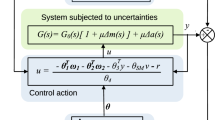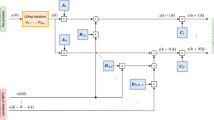Abstract
This paper presents a new optimized decentralized controller design method for solving the tracking and disturbance rejection problems for large-scale linear time-invariant systems, using only low-order decentralized controllers. To illustrate the type of results which can be obtained using the new optimized decentralized control design method, the control of a large flexible space structure is studied and compared with the standard centralized LQR-observer controller. The order of the resultant decentralized controller is much smaller than that of the standard centralized LQR-observer controller. The proposed controller also has certain fail-safe properties and, in addition, it can be five orders of magnitude more robust than the standard LQR-observer controller based on their real stability radii. The new decentralized controller design method is applied to a large flexible space structure system with 5 inputs and 5 outputs and of order 24.
Similar content being viewed by others
References
M. J. Balas. Active control of flexible systems. Journal of Optimization Theory and Applications, 1978, 25(3): 415–436.
P. C. Hughes, R. E. Skelton. Modal truncation for flexible spacecraft. Journal of Guidance and Control, 1981, 4(3): 291–297.
L. Meirovitch, H. Oz. Modal-space control of large flexible spacecraft possessing ignorable coordinates. Journal of Guidance and Control, 1980, 3(6): 569–577.
M. J. Balas. Modal control of certain flexible dynamic systems. SIAM Journal of Control and Optimization, 1978, 16(3): 450–462.
I. Bar-Kana, R. Fischl, P. Kalata. Direct position plus velocity feedback control of large flexible space structures. IEEE Transactions on Automatic Control, 1991, 36(10): 1186–1188.
R. J. Benhabib, R. P. Iwens, R. L. Jackson. Adaptive control for large space structures. IEEE Conference on Decision and Control, New York: IEEE, 1979: 214–217.
Y. Fujisaki, M. Ikeda, K. Miki. Robust stabilization of large space structures via displacement feedback. IEEE Transactions on Automatic Control, 2001, 46(12): 1993–1996.
S. M. Joshi. Control of Large Flexible Space Structures. Lecture notes in control and information sciences. Berlin: Springer, 1989.
S. S. Ahmad, J. S. Lew, L. H. Keel. Fault tolerant controller design for large space structures. IEEE International Conference on Control Applications, New York: IEEE, 1999: 63–68.
S. T. C. Huang, E. J. Davison, R. H. Kwong. Decentralized robust servomechanism problem for large flexible space structures under sensor and actuator failures. IEEE Transactions On Automatic Control, 2012, 57(12): 3219–3224.
G. S. West-Vukovich, E. J. Davison, P. C. Hughes. The decentralized control of large flexible space structures. IEEE Transactions on Automatic Control, 1984, 29(10): 866–879.
M. J. Balas. Trends in large space structure control theory: fondest hopes, wildest dreams. IEEE Transactions on Automatic Control, 1982, 27(3): 522–535.
H. B. Hablani. Generic model of a large flexible space structure for control concept evaluation. Journal of Guidance and Control, 1981, 4(5): 558–561.
E. J. Davison. The robust decentralized control of a general servomechanism problem. IEEE Transactions on Automatic Control, 1976, 21(1): 14–24.
E. J. Davison, B. Scherzinger. Perfect control of the robust servomechanism problem. IEEE Transactions on Automatic Control, 1987, 32(8): 689–702.
E. J. Davison, S. H. Wang. Properties and calculation of transmission zeros of linear multivariable systems. Automatica, 1974, 10(6): 643–658.
E. J. Davison, D. E. Davison, L. Simon. Multivariable three-term optimal controller design for large-scale systems. IEEE Conference on Decision and Control, New York: IEEE, 2009: 940–945.
E. J. Davison. Multivariable tuning regulators: the feedforward and robust control of a general servomechanism problem. IEEE Transactions on Automatic Control, 1976, 21(1): 35–47.
L. Qiu, B. Bernhardsson, A. Rantzer, et al. A formula for computation of the real stability radius. Automatica, 1995, 31(6): 879–890.
S. Lam, E. J. Davison. Computation of the real controllability radius and minimum-norm perturbations of high-order, descriptor, and time delay LTI systems. IEEE Transactions on Automatic Control, 2014, 59(8): 2189–2195.
Author information
Authors and Affiliations
Corresponding author
Additional information
This work was supported by the Natural Sciences and Engineering Research Council of Canada (No. A4396).
Xiao Qi SHI was born in ShangHai, China, in 1990. He received B.A.Sc and M.A.Sc degrees from the University of Toronto in 2013 and 2015. He is currently a Ph.D. candidate in University of Toronto, ECE department, Systems Control Group.
Daniel E. DAVISON was born in Toronto, Canada, in 1970. He received the B.A.Sc. and M.A.Sc. degrees from the University of Toronto in 1992 and 1994, and the Ph.D. degree from the University of Michigan in 1997. In 1997 he joined the University of Cambridge, U.K., as a research associate, and in 2000 he joined the University of Waterloo, Canada, where he is now an Associate Professor. His current research interests include multivariable linear control, time-delay systems, and performance limitations in feedback control systems. Recent application areas include radiotherapy, multi-agent systems, and psychological dynamical systems. Dr. Davison is a Professional Engineer of Ontario, Canada.
Raymond KWONG received the S.B., S.M. and Ph.D. degrees in Electrical Engineering from the Massachusetts Institute of Technology, Cambridge, in 1971, 1972, and 1975, respectively. From 1975 to 1977, he was a visiting Assistant Professor of Electrical Engineering at McGill University and a Research Associate at the Centre de Recherches Mathematiques, Universite de Montreal, Montreal, Canada. Since August 1977, he has been with the Edward S. Rogers Sr. Department of Electrical and Computer Engineering at the University of Toronto, where he is a Professor. His current research interests include estimation and stochastic control, adaptive signal processing and control, fault diagnosis and fault-tolerant control, discrete event systems, and cybersecurity.
Edward J. DAVISON was appointed as University Professor of Electrical and Computer Engineering at the University of Toronto in 2001, and as University Professor Emeritus in 2004. He was inducted into the University of Toronto’s Engineering Alumni Hall of Distinction in 2003. Dr. Davison has received several awards including the National Research Council of Canada’s E.W.R Steacie Memorial Fellowship 1974–1977, the Canada Council Killam Research Fellowship 1979–1980, 1981–1983, two IEEE TRANSACTIONS ON AUTOMATIC CONTROL Outstanding Paper Awards, and a Current Contents Classic Paper Citation. He was elected a Fellow of the Canadian Academy of Engineering in 2005, a Fellow of the International Federation of Control (IFAC) in 2005, a Fellow of the Institute of Electrical and Electronic Engineers in 1977, a Fellow of the Royal Society of Canada in 1977, an Honorary Professor of Beijing Institute of Aeronautics and Astronautics in 1986, a Guest Professor of Tokyo Denki University in 2005 and has been a designated Consulting Engineer of the Province of Ontario since 1979. In 1998, he was elected a member of the Academy of Nonlinear Sciences (ANS), Moscow, Russia, in 1996 he received the Outstanding Member Service Award from IFAC, in 1984, he received the IEEE Centennial Medal and was elected a Distinguished Member of the IEEE Control Systems Society. He has served on numerous positions in the IEEE Control Systems Society including President in 1983 and Consulting Editor of the IEEE TRANSACTIONS ON AUTOMATIC CONTROL in 1985. He was Chairman of the IFAC Theory Committee in 1988–1990, Vice-Chairman of the IFAC Technical Board in 1990–1993, and a member of the IFAC Council in 1991–1996. He has served on numerous Editorial Boards of various journals. In 1993, he was awarded the triennial Quazza Medal from the International Federation of Automatic Control, in 1997, he received the IEEE Control System Society’s Hendrick W. Bode Lecture Prize, and in 2003, he received the Canada Council Killam Prize in Engineering. In 2010 he was elected a foreign member of the NAE and awarded the Canada Outstanding Engineer Award from IEEE (Canada).
Rights and permissions
About this article
Cite this article
Shi, X.Q., Davison, D.E., Kwong, R. et al. Optimal decentralized control of large scale systems. Control Theory Technol. 14, 287–313 (2016). https://doi.org/10.1007/s11768-016-6091-9
Received:
Revised:
Accepted:
Published:
Issue Date:
DOI: https://doi.org/10.1007/s11768-016-6091-9




